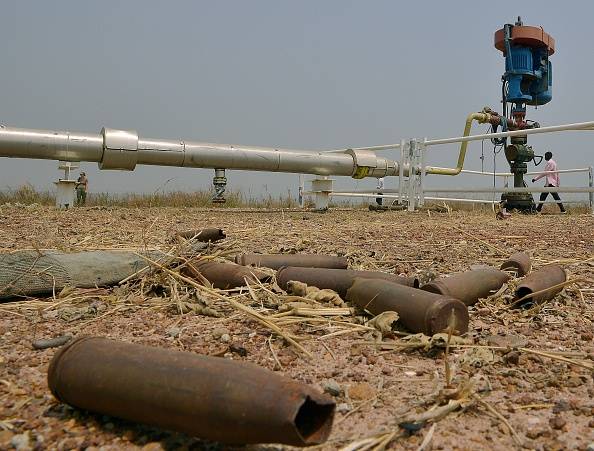
South Sudan was already in crisis before the pipeline closure sent shock waves through its economy. (KARUMBA/AFP via Getty Images)
Galiché Buwa, 75, a widow and mother of four from South Sudan, has lived through civil war, famine and natural disasters but her grocery shop business has kept her afloat.
But now the wait is precarious after a key pipeline ruptured in neighboring war-torn Sudan in February and the oil-dependent country's economy is reeling from lost revenue.
The damaged pipeline is vital for transporting South Sudan's crude oil overseas, and oil exports normally account for about 90 percent of the impoverished country's GDP.
The impact has been widespread, with the South Sudanese pound (SDG) plummeting in value against the US dollar on the black market from SDG2,100 in March to currently SDG3,100, and inflation soaring.
The official rate fell from about SDG1,100 in February to almost SDG1,550 this month.
“I've been here since the 1970s and am still here but these days we are struggling. Things are tough,” said Buwa, who runs his shop at Konyo Konyo market in the capital, Juba.
“We can't buy stock, it's expensive and prices are going up every day,” she said, forcing her to buy supplies on credit.
When wholesale prices spike, retail prices follow suit. A cup of maize sold by Buwa was worth SDG800 in March but is now worth SDG2,000, she said.
Teddy Away said he struggles to put food on the table and only feeds his family one meal a day.
“I went to the market today and asked a price, and when I went back tomorrow the price was different. I had to go home without buying anything,” Awey said. “Life is really hard.”
It was a common refrain in Juba's biggest market, where several traders said their losses were piling up every day.
Abdulwahab Okwaku said his slaughterhouse was under threat.
“Customers who used to buy a kilo are now buying half a kilo, and customers who used to buy half a kilo are now buying 25 cents… and the customers who used to buy 25 cents aren't coming anymore,” he said.
The father of eight children often incurs losses because he cannot sell the meat before it spoils, and many of his fellow butchers have quit because they can't make a living.
Harriet Gyun said her fashion boutique was losing customers.
“The more you raise the prices of things in your store, the more customers will move away,” she said.
A pair of jeans that cost SDG25,000 in March now sells for SDG35,000, she said, adding that she had to increase prices “to have enough capital to order new stock”.
Government officials are also feeling the pinch. In May, Finance Minister Auwo Daniel Chuan told parliament that a revenue shortfall would mean the country would struggle to pay the salaries of lawmakers, the military, police, civil servants and other officials. He said the country had lost about 70 percent of its oil revenues because of the pipeline rupture, which affected exports of Nile Blend and Dahl Blend crude oils.
“Only blocks 12, 14 and 58 are in production, which means only about 30 to 35 percent of the oil is leaking,” he said.
South Sudan was in crisis even before the pipeline shutdown sent shock waves through the economy and there were fears elections scheduled for December might be postponed.
Corruption has depleted the treasury, the ruling elite are regularly accused of plundering, and the country imports almost everything, including agricultural products, making it vulnerable to currency shocks.
The situation in Sudan has worsened since April 2023, with fighting continuing between the army and the paramilitary Rapid Support Forces.
The conflict has killed tens of thousands of people, forced millions to flee – more than 700,000 of them to South Sudan – and pushed Sudan to the brink of famine.
Abraham Mariet Mamah, an economist and government adviser, said South Sudan, which declared independence from Sudan in 2011, needed to plan to secure its future.
“Our country is suffering. Funding is down, services are declining and security is an issue,” he said, calling on the government to build refineries and pipelines through other countries.
“Sudan will never be the same again. The problems will continue until an alternative is found,” he warned. — AFP

